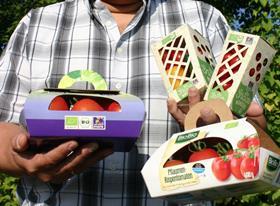
Paul Hendriks, packing expert at Dutch organics specialist Eosta, is working to resolve a frequent dilemma faced by modern consumers concerned about the environment: choosing between loose conventional and packaged organic products.
'There are many studies showing that the organic consumer has a strong dislike for plastic packaging,” said Hendriks. “Logically speaking, one would not expect the most sustainably grown product to be packed in unsustainable material. In fact, logically speaking, the most sustainable packaging form is not to pack at all!”
Limiting the amount of packaging as far as possible therefore remains the best bet, a policy adopted by Swedish retailer ICA. 'Every time you handle a piece of fruit, you are adding resources and energy and often you also increase the chance of decay,” said Hendriks. “If you can offer an unpacked product, that's always the most sustainable option. The leading Swedish supermarket chain ICA has turned this important insight into a formal packing policy: only pack if there's no other way. More supermarkets should follow their example.'
With Eosta, Hendriks has been working since 2003 to eschew oil-based plastics. “That journey has brought us from PLA (plastic derived from corn) and other bio-based plastics to sugarcane carton, compostable stickers with compostable glue, and new ways to offer produce unpacked,” he revealed.
New innovative solutions developed by Hendriks include a shaker for snack vegetables made from sustainable sugarcane waste material and a cardboard carry tray to replace flow packs. Such packaging is apparently suitable for a multitude of products, such as tomatoes, kiwifruit, lemons and avocados.
Eosta’s previous launch of environmentally friendly trays made from this same sugarcane waste material has reportedly saved thousands of kilograms of plastic each year.
'The carry trays, shakers and sugarcane trays together will save at least 2.5m plastic trays per year,” said Hendriks. “And we haven't even mentioned transport and hidden costs of plastic production yet. Packaging is a whole world in itself.'






No comments yet